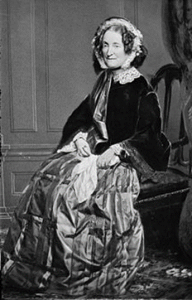As we continue exploring the strength of American women (see part 1 and part 2) we note that de Tocqueville regarded their role in domestic life as an indication of nobility.
As for myself, I do not hesitate to avow that, although the women of the United States are confined within the narrow circle of domestic life, and their situation is in some respects one of extreme dependence, I have nowhere seen woman occupying a loftier position.
The “loftier position” de Tocqueville observed was that of a queen in the home, monarch of the manor. And though her engagement began in the home, her sphere of influence expanded to the larger community and ultimately, as we noted in the example of some maternal feminists, shaped the world.
One American maternal feminist was Lydia Sigourney. Her instruction helps us understand why it is such a noble role.
It is in the domestick sphere, in her own native province, that woman is inevitably a teacher. There she modifies by her example, her dependents, her companions, and every dweller under her own roof. Is not the infant in its cradle, her pupil? Does not her smile give the earliest lessons to its soul? Is not her prayer the first messenger for it in the court of Heaven? Does she not enshrine her own image in the sanctuary for the young child’s mind, so firmly that no revulsion can displace, no idolatry supplant it? (Letters to Young Ladies, page 11-13)
Sigourney suggests that the domestic sphere is the woman’s primary responsibility. This does not mean that there is no place for her in the public sphere. Quite the contrary. Sigourney has written elsewhere about the importance of the woman’s role in public life. Her own life is a testimony of the balance she achieved between the domestic and public spheres.
Why is the domestic sphere so important? Because the woman is a teacher, both in her example and in her words. And who does she teach? “Every dweller under her own roof.” This would include her friends and family, her husband and children.
Alexis de Tocqueville found nobility in American women
Sigourney focuses particularly on the “infant in the cradle.” The winsome and conscientious mother first teaches the baby by her loving presence in her child’s world. Her simple smile, her prayers for her child, her face-to-face intimacy … all these are teaching the young child lessons for eternity while still in the cradle.
When a child is injured we witness the power of the maternal–infant bond. For whom does the hurt child cry? “Mommy!” When a soldier is dying in the field of battle, whom does he long for? His mother! Why? Because through her conscientious intimacy, the mother has impressed her own soul onto the life of her child.
 The mother is the teacher, but what will she teach? Sigourney writes:
The mother is the teacher, but what will she teach? Sigourney writes:
Admitting then, that whether she wills it or not, whether she even knows it or not, she is still a teacher — and perceiving that the mind in its most plastick state is yielded to her tutelage, it becomes a most momentous inquiry what she shall be qualified to teach. (Page 12-13)
The mother may be a good teacher or a bad teacher, she may be consciously instructing or unintentionally teaching—but in any case she is a teacher.
Mothers are teachers at the time when the minds and hearts of young children are most vulnerable and impressionable. If the mother is rude or inattentive, this will leave a lasting, adverse impression on the child. If she puts her child’s need above her own, if she is loving and kind to her child, this will leave a very different impression on the soul of the child.
With this wondrous opportunity, the wise mother will take the time to cultivate her own soul and mind. She will do so in order to provide the greatest fount of wisdom and human flourishing upon her own child.
Sigourney continues,
Will she not of necessity impart what she most prizes, and best understands. Has she not power to impress her own lineaments on the next generation? If wisdom and utility have been the objects of her choice, society will surely reap the benefit. If folly and self-indulgence are her prevailing characteristics, posterity are in danger of inheriting the likeness. (Page 12-13)
 Again, the mother will be a teacher, but what will she teach? The mother will pass on, for good or ill, what is most important to her. If she is wise, she will pass wisdom and practical knowledge to her children. If she is foolish in character and lazy in her daily affairs, she will imprint these flaws upon her children.
Again, the mother will be a teacher, but what will she teach? The mother will pass on, for good or ill, what is most important to her. If she is wise, she will pass wisdom and practical knowledge to her children. If she is foolish in character and lazy in her daily affairs, she will imprint these flaws upon her children.
For a number of years my wife was a post-partum community health nurse. Often, she visited poor families to coach the mother in breast feeding and to make sure her baby was thriving. One day she came home after visiting a teenage mother. Marilyn said it was one of the saddest things she had ever experienced. Four generations of women were sitting in a darkened room staring at soap operas. On the couch together were the young mother with her baby. She was sitting next to her mother and her grandmother. They were sitting in squalor, with no motivation to do anything but watch TV. The folly of the grandmother had passed from one generation to another.
De Tocqueville concludes,
If I were asked, now that I am drawing to the close of this work, in which I have spoken of so many important things done by the Americans, to what the singular prosperity and growing strength of that people ought mainly to be attributed, I should reply – to the superiority of their women.
- Darrow Miller






2 Comments
tom moore
October 12, 2015 - 10:08 pmWant to topple a society? Undermine the purity and purpose of its women.
admin
October 14, 2015 - 1:34 pmWell said, Tom. Thanks for reading and responding!
Gary Brumbelow